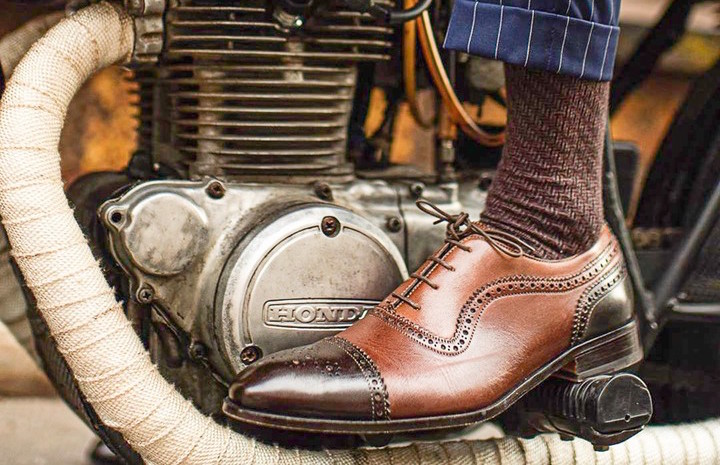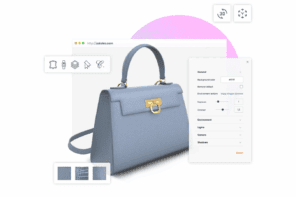The internet has brought dramatic changes to the world of luxury retail. Those who know how to harness its power, thrive. The rest suffer, or even die.
High-end men’s dress shoe company Ace Marks is proving a disruptive influence on the world of luxury footwear. As the unorthodox brand continues to rise, we spoke to Ace Marks’ founder, Paul Farago, to learn how this Italian-made shoe company is combining tech and tradition to shake up the industry.

Far from the automated world of fast-fashion, luxury shoe making has remained largely unchanged for decades, if not centuries. Think family-owned workshops deep in the Tuscan countryside, using traditional stitching techniques, and burnishing precious leathers to a deep patina entirely by hand.
Invariably these traditional ways of manufacturing are accompanied by equally traditional methods of promotion and distribution; keeping this sector of the market in the hands of a few key players, and guaranteeing correspondingly exclusive prices.
But all this was before Ace Marks.
What is Luxury?
But let’s take a moment to consider what we mean by “luxury” footwear. Essentially “luxury” goes beyond the basic necessities. It’s an item we could all live without, but which most of us nonetheless desire to live with; because it’s better. To qualify as luxury then, ideally a product should be superior in terms of performance, quality of construction, or the materials used. Preferably all three.
In practice though, not all products sold as luxury items fulfill even a single one of these criteria. Often it just comes down to clever marketing. Other times it’s because the price is so high that nobody would dare suggest it was anything but a superior product.
To be sure, high-quality design, materials, and craftsmanship cost money. So you won’t find genuine luxury below a certain price bracket. Yet there also comes a point where paying more money will bring rapidly diminishing returns. This is particularly true of luxury dress shoes; save for encrusting the soles with rare black opal, or stitching the uppers with a gold-coated silk thread, once you’ve paid for good quality leather and workmanship, there’s a limit to how much extra value can be added in terms of materials and construction.
The implications are clear: spend very little on your shoes, and they’ll be ill-fitting, uncomfortable, and soon fall apart; but spend a bit more, and the higher quality materials and more skillful handiwork will lead to an excellent quality shoe. Pay more than this, though, and either you’re getting bespoke footwear modeled to your own feet, or frankly you’re wasting your money. Indeed, even many of those who purchase genuinely luxury footwear could likely find the same quality of product elsewhere for much less. If only they knew where to look. It was this realization that gave birth to Ace Marks.
A Brand is Born
Ace Marks founder Paul Farago grew up in a family of shoe makers, his childhood summers spent among hides and lasts in the workshops of Italian artisans. “While my parents would work on their collections, I would hang out on the factory floor. We would spend days working out details that seemed like complete minutia at the time, but which I now appreciate make the difference between our shoes and everybody else’s.”
Like any healthy child, Paul initially rebelled against this upbringing. In his case, this meant studying to be an investment banker and then practicing law. Thankfully though, this period of insurrection didn’t last long, and by 2008 Paul has found his way back into the family business.
It was only around 2012, however, that the idea of starting his own shoemaking venture began to take seed. Frustrated after repeatedly paying good money for very bad shoes, Paul became adamant that with his expertise and contacts he could provide discerning men with a vastly superior product – and for a much better price. “Between this epiphany and the decline of retail and consumer options that I have seen over the last ten to fifteen years, I made up my mind that I was going to do something about it and that I was uniquely positioned to do so.”

How Ace Marks Has the Luxury Shoe Industry Running Scared
Think you know luxury footwear when you see it? I asked Paul to define what makes a high quality dress shoe: “Physically, a good dress shoe is one that has a beautifully sleek, yet powerful, shape. It is made out of excellent materials, fits well, is comfortable to wear, and is well crafted. It makes you feel more confident when you put it on.” Ultimately, then, luxury footwear is about you. You’re the one who knows how the shoe was made, where it was made, and who made it. That’s true luxury.
It goes without saying that Ace Marks’ shoes fit the above description in every aspect. In this respect though, the brand is not entirely unique. Indeed, over the course of history many luxury shoe companies have produced equally high-quality footwear. So just why is Ace Marks so threatening to the luxury footwear sector right now?
On this matter Paul is unequivocal in his response: “What it comes down to is that we’re offering a real luxury product at a truly accessible price point.” It makes sense; as the Ace Marks’ business model unavoidably reveals the extent to which competitors’ mark-up their products, this undoubtedly makes a few people in the industry very uncomfortable.
Yet, remaining somewhat skeptical, I wonder how Ace Marks can produce what is undoubtedly a great product, but do so while significantly undercutting competitors and still turn a profit. “I’ve been in the luxury footwear business for twenty years – my family even longer – so we’ve nurtured multi-generational manufacturing relationships that provide access to costs that are not readily available to others. We also choose not to mark-up our products as much as we could, and we work efficiently with a small but highly experienced team and low overheads. We pass all of those savings on to our customers.”

People Before Product
However, aside from the quality of the shoes themselves, I’d wager that part of Ace Marks’ rapid success comes down to the direct relationship Farago has succeeded in creating with his customers. Initially this was through Kickstarter, where the brand was the most funded shoe company ever; raising $2.5 million in the space of two years. This has since continued via Ace Mark’s own preorder campaigns, allowing customers to suggest new designs.
I was curious to know how this all came about: “One of the things that I did not want to do when I started was to be just another shoe brand selling online. A real relationship with your customers is very important. I always liked going into the local store where everyone knows your name, and I want to translate that as much as possible into what we’re doing. We regularly hold live streams where we have conversations directly with our customers. And we have done it enough now that we know a lot of them by name. When they log on to a live stream, I often know what they bought, what they want us to make in the future, what size they are; just like at your local store.“
I can see how such a tactic would work in the early years of a business, but I can’t help wondering how Ace Marks will maintain these relationships as the company grows. But Paul is unfazed: “We’re actually building capabilities where our customers are going to be even more involved during every step of the product-creation process. We’ll be doing more live streams, we’re creating events locally in different cities so everyone can come and hang out. Our Factory Access campaigns give core customers the opportunity to purchase unique and limited-edition products. I think we’re all fed up of being fed corporate taglines and empty jargon that mean nothing. We’re trying to be the opposite of that, so continuing to build these relationships is a huge part of our plan going forward.”

Innovation in Tradition
Aside from permitting Ace Marks to maintain a close relationship with its customers, the brand’s business model is also quite radical in that it overturns the way in which the luxury shoe industry has done things for the best part of a century. I.e. they’ve sidelined the middleman by selling directly to customers. While in some respects this is a return to the old-fashioned way of producing shoes – without need for distributors or stockists – clearly this has only become possible due to modern digital technologies.
I ask Paul whether the changes brought about by the internet have had far-reaching consequences for the footwear and fashion industries more generally. “Absolutely. And I think that you’re starting to see it with the number of retail stores and legacy brands that are going out of business. You can say that the first iteration of e-commerce was just about putting product on a website and giving your customers another purchasing channel. But the future of e-commerce is much more particular, much less “mass”. While it’s still electronic, it has to be more personal and tailored to your customer.”
And how is the old-guard of luxury footwear coping with these changes? “It’s mixed. Some understand how to embrace the technology better than others. Some tailor their offerings and conversations to their customers really well. In any case, some people purchase luxury goods for the image alone and don’t care so much whether the product is quality or handcrafted: they just want the logo.” I mention that I find it hard to imagine that this is who would buy Ace Marks. “No, that’s not our customer. Our customer is well-educated on the product, the manufacturing process, the materials, and the people behind it. They’re interested in quality, not hype.”
So do these changes put some legacy brands at risk? “These days anybody can be at risk, no matter how long you’ve been around. So yes, they have to take it seriously. Some are able to react fast enough, but they definitely feel threatened by the changes. Meanwhile others have embraced them and are thriving as a result.”
It’s perfectly clear in which of these two camps Ace Marks lies, and so I ask Paul what his plans are for the brand moving forward. As he answers, it’s obvious just how upbeat he is about the future of the business: “We are in the process of creating many more styles and products. We also want to provide really unique experiences and opportunities that have never been offered before in the direct-to-consumer footwear business. You’re going to see a whole range of new innovations, so watch this space.”
We certainly will!





